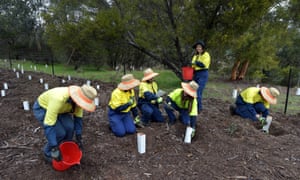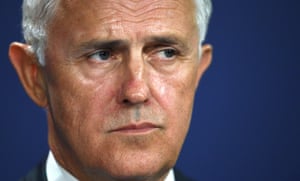Extract from The Guardian
Tuesday, question time. Malcolm Turnbull says extra Commonwealth
funding will make no real difference to schools, in almost the same
words Tony Abbott used to say the same thing; that “teacher quality” and
“school autonomy” are more important than money – as if these things
are either/or propositions. It’s a claim that relies on the electorate forgetting that his friend David Gonski was ever asked to report on the school system, forgetting what the Coalition said during the last election and forgetting all the evidence
that disadvantaged schools and students are, indeed, falling further
behind. People don’t easily forget things that bear upon the wellbeing
of their children.
Thursday, question time. Turnbull freely admits his policy on same-sex marriage was not his choice.
“It is certainly not the approach that I favoured at the outset. I am a traditionalist. This was a case of democratic innovation,” he chortled, jollying the debate past the fact that it’s an approach that makes no sense and that he had himself once said so.
Thursday, a corridor somewhere near the press gallery. The veteran backbencher and Turnbull loyalist Russell Broadbent finally cuts through all the “backbench revolt” hyperventilation and asks the real question about the GST, which the government has, for some time, been talking about in such definitive terms that backbenchers were responding as if it were policy: “Why are we doing this again?”.
“I am yet to hear a coherent argument as to why we are doing this, an argument I could use to convince the people of my electorate,” Broadbent says.
Friday, a radio studio talking to breakfast presenters in Adelaide. Turnbull is now making it absolutely clear he is deeply unconvinced about the merits of a GST increase by pointing out the extreme difficulties of it meeting his economic growth goal, and is seriously floating an idea that has remained in the shadows of the tax debate – a nationally uniform land tax.
Four months into his prime ministership, and at most eight months out from an election, Turnbull remains stuck between the Abbott-era positions he felt compelled to retain and his own policy ideas, which he hasn’t worked out yet. The rock-hard commitments he had to give the Nationals and the conservatives to get the job and the hard place of working out big policy ideas, something parties usually do in their first year in office, or from opposition.
His tax package, the policy that more than any other is supposed to deliver on the promise he made to justify his coup (a sensible economic policy to deliver higher growth), is proving hardest of all.
He, quite sensibly, put all options back on the table, but then the government realised it did not have sufficiently rigorous information and modelling to start narrowing things down. The treasurer kept saying how he was up for the fight to convince voters to back a GST increase (apparently it is a lot like convincing people of the merits of boat turn-backs and, according to an anonymous source, marginal seat-holders nervous about it are “bedwetters”) but the prime minister says he’s not sure the economic dividend is worth the effort. Is he abandoning the idea or just trying to wrest back some control of the debate?
The only thing that seems clear is that a final tax policy won’t emerge until about the time of the budget, and that when it does, it won’t increase the overall tax take, which leaves unanswered the question of how the states are supposed to find money for the looming funding crisis in health and education.

Thursday, question time. Turnbull freely admits his policy on same-sex marriage was not his choice.
“It is certainly not the approach that I favoured at the outset. I am a traditionalist. This was a case of democratic innovation,” he chortled, jollying the debate past the fact that it’s an approach that makes no sense and that he had himself once said so.
Thursday, a corridor somewhere near the press gallery. The veteran backbencher and Turnbull loyalist Russell Broadbent finally cuts through all the “backbench revolt” hyperventilation and asks the real question about the GST, which the government has, for some time, been talking about in such definitive terms that backbenchers were responding as if it were policy: “Why are we doing this again?”.
“I am yet to hear a coherent argument as to why we are doing this, an argument I could use to convince the people of my electorate,” Broadbent says.
Friday, a radio studio talking to breakfast presenters in Adelaide. Turnbull is now making it absolutely clear he is deeply unconvinced about the merits of a GST increase by pointing out the extreme difficulties of it meeting his economic growth goal, and is seriously floating an idea that has remained in the shadows of the tax debate – a nationally uniform land tax.
Four months into his prime ministership, and at most eight months out from an election, Turnbull remains stuck between the Abbott-era positions he felt compelled to retain and his own policy ideas, which he hasn’t worked out yet. The rock-hard commitments he had to give the Nationals and the conservatives to get the job and the hard place of working out big policy ideas, something parties usually do in their first year in office, or from opposition.
His tax package, the policy that more than any other is supposed to deliver on the promise he made to justify his coup (a sensible economic policy to deliver higher growth), is proving hardest of all.
He, quite sensibly, put all options back on the table, but then the government realised it did not have sufficiently rigorous information and modelling to start narrowing things down. The treasurer kept saying how he was up for the fight to convince voters to back a GST increase (apparently it is a lot like convincing people of the merits of boat turn-backs and, according to an anonymous source, marginal seat-holders nervous about it are “bedwetters”) but the prime minister says he’s not sure the economic dividend is worth the effort. Is he abandoning the idea or just trying to wrest back some control of the debate?
The only thing that seems clear is that a final tax policy won’t emerge until about the time of the budget, and that when it does, it won’t increase the overall tax take, which leaves unanswered the question of how the states are supposed to find money for the looming funding crisis in health and education.

And while tax change remains hard, all but the flakiest of the Abbott era ideas appear immovable.
A few are being quietly put to pasture. Knights and dames, for example, or the news this week that the bonfires of red tape will burn no more.
With Pyne-esque chutzpah, the assistant productivity minister, Peter Hendy, explained that his work was largely done. Despite truly heroic estimates of their economic value to the nation (at least $1bn a year), the red tape repeal days were mostly about removing anachronisms and correcting punctuation in the nation’s legislation. As annoying as errant apostrophes and misplaced hyphens can be, they probably didn’t warrant their own website, nor were so offensive as to need incineration.
Abbott’s beloved “green army” also appears to be quietly marching off the political stage after its budget was nearly halved in the mid-year economic update. But the “Direct Action” climate policy remains unchanged, despite being demonstrably unfit for purpose, and senators such as Ian Macdonald, who thinks the idea that the climate has changed more since the dawn of the industrial age is a “fad”, were utterly delighted when the CSIRO announced this week that it was directing funding away from climate research.
“I have to say that is the approach that the late Professor Bob Carter, who was pilloried high and low by the Labor party and the Greens political party. That is the view Professor Carter has been espousing for a long time. He and I have always said, ‘Of course the climate is changing.’ As I often say – giving an extreme example – once upon a time Australia was covered in snow. It is not now, so clearly the climate has changed since aeons ago. What the CSIRO are now doing is saying, ‘Right, we accept the climate has changed.’ CSIRO scientists did a lot of work on this ... We’ve got to move on now,” he crowed in the Senate.
If the GST is shelved, the government will go to the election promising changes to superannuation, perhaps to negative gearing and cuts to family payments to fund a lower personal tax, while Labor makes similar cuts to super and probably negative gearing to pay for hospitals and schools.
So how would the parties then answer Broadbent’s very good question – what is the problem for which the proposed policies are the solution?
For the government, the answer would be bracket creep as an impediment to productivity and growth. It’s an issue identified by successive Treasury secretaries as a long-term problem but at a time of record low wage growth possibly not the country’s most hot-button issue. For Labor, the answer would be underfunded hospitals and disadvantaged schools falling behind.
For the moment, the rock and the hard place are obscured by the Coalition’s runaway polling success. Turnbull is preferred by 59% of the electorate, and for good reason is at almost unbackable odds to win this year’s election.
But Shorten does have the advantage of entering the election fight knowing what he’s selling and why, and not having to spruik a bunch of policies everyone knows he doesn’t believe in.

No comments:
Post a Comment